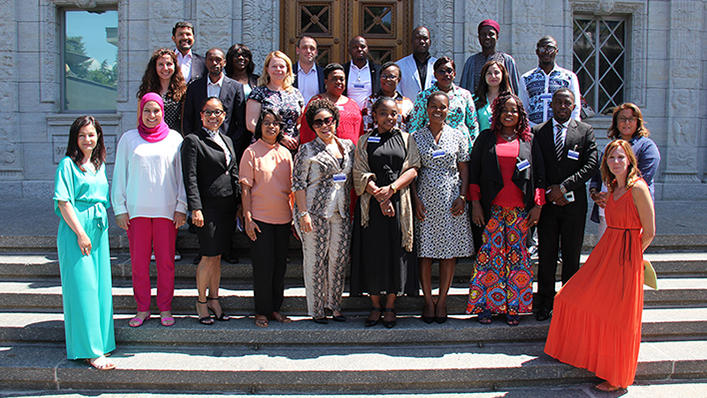
The WTO training course on trade and gender targeted trade negotiators and government officials from various ministries, including trade, foreign affairs and finance. The aim of the course was to develop officials’ expertise on trade and gender issues and to provide guidance on policy tools for integrating gender issues into their trade policies and development objectives.
Lectures, group exercises and brainstorming sessions allowed participants to improve their capacity to analyse, formulate and implement trade policies that support increasing women’s access to trade and economic opportunities. In addition, they were able to familiarize themselves with trade and gender issues related to standards and innovation and to discuss the topic of violence against women.
“Gender equality objectives are part of the 21st century agenda. Therefore, realizing why and how these issues are important for trade was a key takeaway of this course,” said Frederico Petrecca, First Secretary at Argentina’s Ministry of Foreign Affairs, International Trade and Worship. “By providing a cross-cutting view of how trade affects women, the course enabled us to consider the implications for international treaties and negotiations, as well as for domestic policy,” he added.
The training course also allowed participants to share experiences and best practices on promoting opportunities for women in international trade, noted Inès Monwanou, Director of Economic and International Trade Relations at Benin’s Ministry of Foreign Affairs. “The course will help me to propose measures and take decisions that will integrate gender aspects into trade policy, in particular regarding the development of women’s entrepreneurship,” she added.
Akouvi Soke Klolly, Focal Point for Women and Youth in Trade at Togo’s Ministry of Trade, Industry and Local Consumption, highlighted that the policy tools presented during the course and the simulation exercises enabled her to get to grips with how to design gender-responsive trade policies.
Eric Ambassa, International Trade Contractual Executive at Cameroon’s Ministry of Trade, said acquiring an understanding of trade and gender issues was particularly important as Cameroon currently coordinates the Africa Group at the WTO. “From my capital’s point of view, it is important to have a grasp of what’s being done in the Informal Working Group on Trade and Gender and to be well informed about all other activities and negotiations underway at the WTO,” he said.
Adjara Tuo Epse Dosso, Head of the International Trade Agreements Department at Côte d’Ivoire’s Ministry of Trade, Industry and SME Promotion, said the knowledge she has gained will be instrumental in helping her implement her country’s trade policy in a way that strengthens women’s trading capacities. “This course is of utmost importance for all African countries and can be particularly useful for those who have not yet integrated gender issues into their trade policies,” she emphasized.
The training course was delivered in French for government officials from Africa, Latin America, Asia and Eastern Europe. Other training opportunities to be offered in 2023 include a special session for Geneva delegates to take place ahead of the 13th Ministerial Conference, which is to be held in February 2024. In addition, an in-person course for Spanish-speaking officials will be held in the first quarter of 2024.
These activities are part of the WTO’s Trade & Gender 360° Strategy, the WTO’s capacity building programme on trade and gender.
Share
Reach us to explore global export and import deals